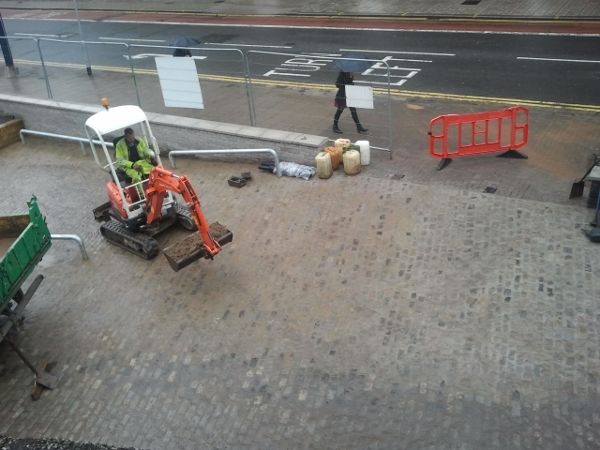Bristol City Council – heritage vandals
Take a look at the picture below, taken in Bristol on Monday 8th October. Fairly unremarkable isn’t it? What’s the most interesting thing about it? The digger perhaps?
No, the most interesting aspect of the picture is what isn’t there. However, before we come to that, a bit of history and context is required.

As the caption states, the image shows Lower Castle Street in central Bristol. The cobbled surface near the foot of the picture shows the street’s old alignment hard by the moat and outer defensive walls of the now demolished Bristol Castle; the modern asphalt surface beyond is the modern alignment of Lower Castle Street designed to accommodate modern motorised traffic. The old cobbled bit of what was Lower Castle Street has been incorporated into Castle Park, which occupies the site of Bristol Castle and what was Bristol’s main shopping area until the Luftwaffe razed it during the Blitz in the Second World War.
Bristol City Council has recently commissioned some works in the corner of the park occupied by the old alignment of Lower Castle Street, as the picture shows. New flowerbeds or grassed areas (it is not yet obvious what they’ll be) have been laid out and the cobbles relaid. So far, so good.
However, before Bristol City Council sent in its contractors to do the works, the old cobbled bit of Lower Castle Street held what some would regard a significant element of the city’s transport heritage: one of the last set of tram rails visible in any road surface in the city and, as can be seen from the picture, these have now vanished; this leaves just one place in the city where tram rails can still be seen set into the road surface – Bristol Temple Meads station, where the tracks are part of the former tram terminus between the ramp and the old station.
Perhaps the City Council thinks that ‘heritage’ is something that belongs in a museum. It doesn’t: it’s part of everyday life in a city like Bristol which has existed since Saxon times; and some parts of the city are even older than that. By its vandalism the City Council has shown it is not a fit and proper curator of the city’s history and heritage.
There’s yet one more place in central Bristol where a tram rail – a single one – can still be seen; it’s in the churchyard of St Mary Redcliffe. During the Second World War a bomb exploded in a nearby street, throwing a rail from the tramway over the houses and into the churchyard, where it remains to this day.
(I am indebted to Pete Insole for information re Temple Meads.)



